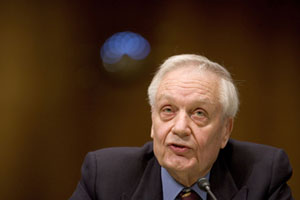| Home | Blog | Ask This | Showcase | Commentary | Comments | About Us | Contributors | Contact Us |

Is there a price for departing from our values?COMMENTARY | April 111, 2009Fritz Schwarz, who helped lead the Church Committee's investigation into intelligence abuses more than 30 years ago, writes that we need to further explore whether our conduct helped al Qaeda's recruitment efforts, and how much excessive secrecy and a complaisant Congress were to blame. Second in a series of articles calling attention to the things we still need to know about torture and other abuses committed by the Bush administration after 9/11. Frederick "Fritz" A.O. Schwarz, Jr. focuses on two questions regarding Bush administration anti-terror policies that he thinks have been particularly underexplored: “What were the consequences, and what were the root causes?” Schwarz was Chief Counsel for the Church Committee, the special Senate committee that from 1975 to 1976 exposed widespread intelligence abuses by the FBI, the CIA and the NSA, over the course of all administrations, from Roosevelt’s through Nixon’s. He is now Chief Counsel at the Brennan Center for Justice at NYU Law School. He testified last month before the Senate Judiciary Committee in favor of an independent and nonpartisan “commission of inquiry.” “I believe that America’s decision to break the rule of law and violate some of our most fundamental values actually made us less safe,” he says. But that hypothesis needs to be thoroughly investigated. Most notably, it’s been widely alleged that our treatment of detainees created enormous recruiting benefits for our enemies, particularly al Qaeda. Schwarz would like to hear some expert testimony on that issue. It’s also been said that other governments -- particularly their intelligence services -- were less willing to cooperate with us because of our treatment of detainees. So, for instance, Schwarz wants to know: “Did British intelligence stop talking to us on certain issues?” A “sober inquiry” into these questions could carry an important lesson: “that America pays a price when it departs from its values.” As for the root causes of the Bush administration’s most excessive departures from core values, Schwarz sees two in particular that deserve intense scrutiny. One is excessive secrecy. Schwarz believes that “too much secrecy results in more likely making bad decisions” and he supports a serious public exploration of how secrecy affects governmental decision-making. The other is that Congress insufficiently exercised its oversight and governing responsibilities. “Congress isn’t as effective a body as it used to be,” Schwarz says. “Our system of checks and balances depends on Congress being an effective partner and an effective critic.” Schwarz thinks Congress’s role in Bush era anti-terror policies – or lack of a role – needs to be more fully documented and discussed. Based on his past experience, Schwarz has some insight into how an investigative commission could work. “The single most important thing is to get the documents,” he says. “You have to have subpoena power. Whether you need to use it is a different question.” When it comes to interviewing witnesses, the distinguished members of the committee are not necessarily best suited for eliciting information, he says. “I think a counsel is going to be better at drawing out the facts.” But members with gravitas can also play an important role when it comes to putting the conduct of the witnesses in context – and expressing the nation’s outrage and values. And he says any group should be very leery of granting immunity to witnesses. “We got hundreds of people to admit to conduct that was a wrong and criminal. Not one asked for immunity,” he said. Schwarz is adamant that some sort of investigation should take place. “One of the strengths of our country is that we are willing to look at what we’ve done and say, if we’ve done it wrong, that we’ve done it wrong,” he says. “But if we sweep it under the rug, we’re worse off.” Internationally, he says, “if they see us refusing to address what much of the world has seen as being a mistake, our reputation will go down, instead of going up. “That’s an important reason for having a commission like this: to help strengthen our standing in the rest of the world. And I think in America, the public would be proud also.” -- Dan Froomkin froomkin@niemanwatchdog.org
|




